The Difference Between Aggravate and Irritate
The Difference Between Aggravate and Irritate
Do you sometimes get confused between the words aggravate and irritate? Don’t worry, it’s a common mix-up. Let’s dive into the meanings and differences between these two words.
History:
The word “aggravate” comes from the Latin word “aggravare,” which means “to make heavier or more serious.” On the other hand, “irritate” has its origins in the Latin word “irritare,” which means “to excite or provoke.”
How to Use Them:
Aggravate is used when something makes a situation worse or more serious. Irritate, on the other hand, is used when something annoys or provokes.
Trick to Remember the Difference:
A trick to remember the difference between aggravate and irritate is to think of aggravate as making things worse (aggravate starts with “aggra-” similar to “aggravate”), while irritate is more about provoking annoyance (irritate starts with “irri-” similar to “irritate”).
Examples of Aggravate:
- The loud noise from the construction site aggravated my headache.
- Adding insult to injury, the rain aggravated the flooding in the area.
- His constant complaining only served to aggravate their already tense relationship.
- Failure to follow the instructions will only aggravate the problem.
- The delay in the flight schedule aggravated the passengers’ frustration.
Examples of Irritate:
- The scratchy tag on my shirt was starting to irritate my skin.
- Her habit of tapping her pen on the desk would irritate the entire class.
- The constant buzzing of the mosquito was beginning to irritate him.
- His snide remarks never failed to irritate his coworkers.
- The repetitive sound of the dripping faucet began to irritate her nerves.
Summary:
Remember, aggravate is about making things worse, while irritate is about annoyance. So, next time you are unsure, think about whether something is worsening a situation (aggravate) or simply provoking a mild annoyance (irritate).

Leave a Reply
You must be logged in to post a comment.